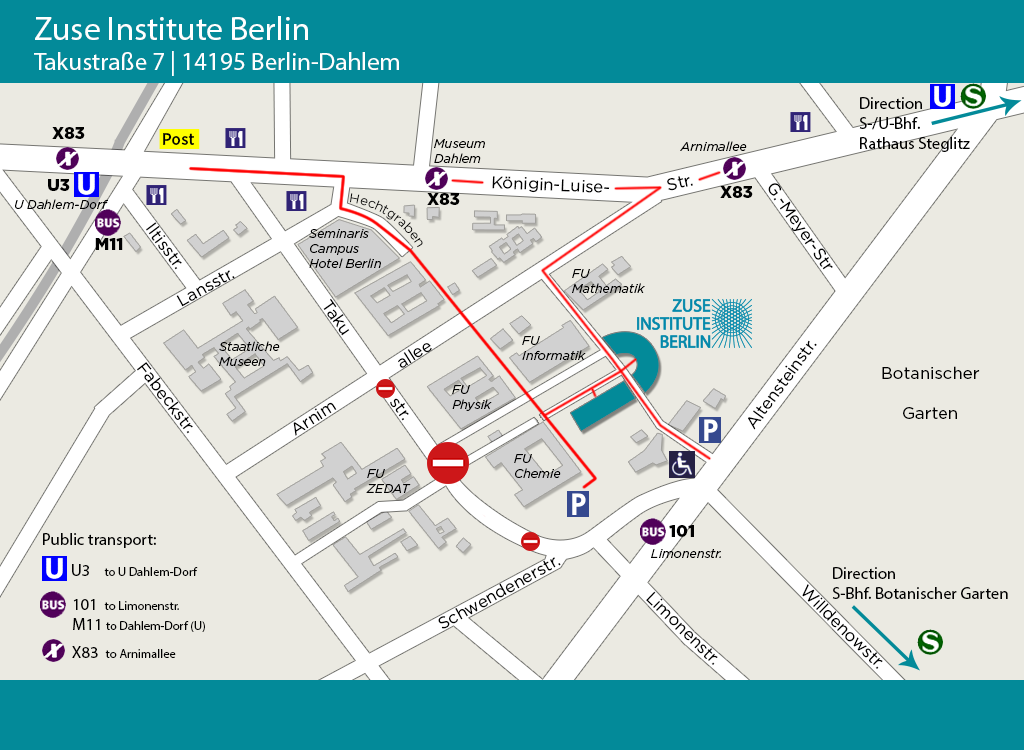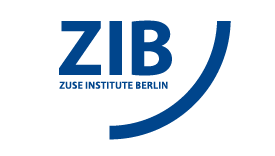14th Annual Meeting Photonic Devices
Date: 28-29 April 2022
Location: Zuse Institute Berlin, Berlin, Germany

The topics of the Annual Meeting Photonic Devices are the simulation, physical properties and deeper understanding of novel photonic devices. The audience consists of physicists, mathematicians and electrical engineers. The intent is to have an active exchange of results, ideas and methods between these different scientific fields from fundamental to applied research. This is also seen in the scientific program of the previous workshops.
Speakers:
Dominik Lentrodt |
Max-Planck-Institut für Kernphysik, Heidelberg |
Multi-mode quantum optics in lossy resonators (invited) |
Manuel Katzer |
Technische Universität Berlin |
Impact of dark excitons on Förster type resonant energy transfer between dye molecules and atomically thin semiconductors (invited) |
Ora Bitton |
Weizmann Institute of Science, Rehovot |
Strong coupling in plasmonic cavities at the single quantum emitter limit (invited) |
Stephanie Reich |
Freie Universität Berlin |
Nanoparticle supercrystals and ultrastrong light-matter coupling in materials (invited) |
Stephan Reitzenstein |
Technische Universität Berlin |
Numerical optimization and deterministic fabrication of quantum devices for applications in photonic quantum technology (invited) |
Tim Liedl |
Ludwig-Maximilians-Universität München |
Assembling functional devices and materials with DNA origami (invited) |
Alexander N. Sprafke |
Martin Luther University Halle-Wittenberg |
Hyperuniform Disorder for Tailored Light Scattering Metasurfaces |
Anna Andrle |
Physikalisch-Technische Bundesanstalt, Berlin |
The reconstruction of nanostructures from grazing incidence X-ray fluorescence measurements with a model-free parameterization and machine learning |
Carsten Henkel |
Universität Potsdam |
Extinction spectra of Au nano-particles coated with resonant absorbers |
Despoina Petousi |
ADVA Optical Networking, Berlin |
Comparison of Depletion-Type PN Phase Shifters for Silicon Photonics Mach-Zehnder and Ring Modulators |
Devashish Pandey |
Technical University of Denmark, Lyngby |
Transfer Matrix Approach to Identify the Effect of Interlayer Distances of Graphene Multilayers in The Far and Near Field |
Emil V. Denning |
Technische Universität Berlin |
Quantum nonlinear optics with atomically thin semiconductors in electromagnetic resonators |
Fridtjof Betz |
Zuse Institute Berlin |
Riesz projection expansion of optical far-field quantities |
Gregor Posnjak |
Ludwig-Maximilians-Universität München |
Self-assembled inverse diamond lattice with visible wavelength periodicity |
Igor V. Bondarev |
North Carolina Central University, Durham |
Broadly Tunable Unidirectional Negative Refraction with Ultrathin Periodically Aligned Carbon Nanotube Films |
Jan Krüger, Bernd Bodermann |
Physikalisch-Technische Bundesanstalt, Braunschweig |
Simulation and Machine Learning for high-accuracy dimensional Microscopy |
Jose M. Llorens |
Instituto de Micro y Nanotecnología IMN-CNM (CSIC), Madrid |
Mie-Tamm optical cavity structure for high-performance single-photon sources |
Julius Kullig |
Otto-von-Guericke-Universität Magdeburg |
Light regulation by phase-space tailoring in chaotic microcavities |
Klaus Jäger |
Helmholtz-Zentrum Berlin für Materialien und Energie |
World-record perovskite/silicon tandem solar cells – the role of photonics |
Lara Greten |
Technische Universität Berlin |
Strong Exciton-plasmon coupling in hybrids of 2D semiconductors and metal supercrystals |
Matthias Plock |
Zuse Institute Berlin |
Efficient Bayesian Target-Vector Optimization for Parameter Reconstruction Applications |
Maximilian A. Weissflog |
Friedrich Schiller University Jena |
A Quasinormal Mode Description of SPDC in Dielectric Nanoresonators |
Mohamed S. Abdelkhalik |
Eindhoven University of Technology |
Bringing nanophotonics into Light-Emitting Diodes (LEDs) for ultra-high brightness |
Mohamed M. Ghobara |
Freie Universität Berlin |
Photonic jets generated by pennate diatom valves |
Nils Wauschkuhn |
Physikalisch-Technische Bundesanstalt, Berlin |
Simultaneous dimensional and analytical characterization of ordered nanostructures using grazing emission X-ray fluorescence |
Paweł Mrowiński |
Wrocław University of Science and Technology |
Towards Si-waveguide coupled quantum dot single-photon source emitting in the telecom C-band |
Philipp Schneeweiß |
Humboldt-Universität zu Berlin |
Atomic spin-controlled non-reciprocal Raman amplification of fibre-guided light |
Richard Ciesielski |
Physikalisch-Technische Bundesanstalt, Berlin |
Parameter-dependent study of periodic nanostructures using soft X-ray scatterometry and model-based reconstruction |
Simone Zanotto |
CNR – Istituto Nanoscienze & Scuola Normale Superiore, Pisa |
Photonic and Phononic metasurfaces for optomechanics |
Tobias Kraus |
temicon GmbH |
Manufacturing, characterization and simulation of interference lithographic stochastic gaussian surface diffusers of varying feature size |
Tomasz Czyszanowski |
Lodz University of Technology |
Bound states in the continuum in all-semiconductor configurations with broken up-down mirror symmetry |
Yujing Wang |
Technical University of Denmark, Lyngby |
Near-unity efficiency in ridge waveguide-based on-chip single-photon source |
|---|
Program
Program: AMPD2022_Final_Program.pdf
Important Dates
Abstract submission deadline: 05 December 2021
Decision about acceptance: 15 December 2021
Registration deadline: 03 April 2022
Workshop: 28-29 April 2022
The AMPD2022, originally scheduled for 17-18 February 2022, has been postponed to 28-29 April 2022 due to the coronavirus pandemic.
Organizers
The Annual Meeting Photonic Devices is organized by members of the Computational Nano Optics group.
Registration and Submission
There is no registration fee. The number of participants is limited.
Please let us know if you would like to give a talk or if you would like to attend the workshop as an audience member without presenting your work.
If you would like to give a talk, please send us a pdf file with a short abstract (up to one page long). No special format is required.
Please email your registration (full name; institution; address; abstract of the talk, if applicable) to
Felix Binkowski.
Corona Regulations
- "3G rule": persons who recovered from COVID, fully vaccinated persons or tested persons are admitted
- Mask obligation exists in all closed rooms
- Limited space in the lecture hall: if the capacity of the lecture hall is exceeded during a talk, participants may have to stay outside temporarily
- The regulations may have to be updated
Venue & Travel
14th Annual Meeting Photonic Devices will be held at Zuse Institute Berlin.
Zuse Institute Berlin
Takustraße 7
14195 Berlin
Germany

Supported by



